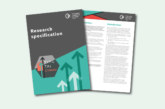A new report published by the Scottish Federation of Housing Associations (SFHA) has found that 55% of housing association and co-operative senior leaders would rate their staff’s digital skill levels as ‘excellent’ or ‘high’.
The findings also indicate the influence the coronavirus pandemic has had on the social housing sector, with over half of CEOs saying that digital progression is a strategic priority for their organisation.
SFHA has published the findings from its report, Digital Maturity of the Scottish Housing Sector, after creating a tool, together with the Scottish Council for Voluntary Services (SCVO), for members to measure and compare their digital progression and maturity against other housing associations and co-operatives.
The tool focuses on six key areas — leadership, culture, and skills; tools and equipment; content and marketing; data and cyber resilience; technology enabled care in housing; and priorities and barriers — and gives organisations an overall digital maturity score.
With the coronavirus pandemic having forced rapid and significant digital change, the findings showed that 86% of SFHA members have put a digital strategy in place or are in the process of creating one.
In terms of rating staff digital skills, 55% of senior leaders said their colleagues’ levels are either ‘excellent’ or ‘high’, however, 19% said they were unsure of staff skill levels.
The majority of CEOs — 66% — categorised their staff as having ‘medium’ or ‘high’ levels of digital confidence, and only 4% said their staff have low levels. However, looking at their tenants’ digital engagement levels, only 6% of senior leaders rated their tenants as being highly engaged with their organisation online — 34% reported ‘medium’ levels of online engagement and 60% as ‘low’, indicating a significant area for improvement.
The research also found that while more traditional methods of technology, such as websites and emails, are the most popular forms for organisations to use — 100% of all organisations were found to use both — 73% of organisations have given staff and customers mobile access to their systems via phone or tablet, 52% are using cloud computing or storage, and 45% have introduced messaging and/or collaborative platforms, which is likely to be as a direct result of the pandemic.
Gary Dickson, SFHA Digital and Design Manager, said: “The term digital maturity is tricky to define. In its simplest form, it can be described as how mature your organisation’s digital capabilities are. These capabilities don’t just include the technology you use – it’s about your business strategy, structure, leaders, teams, staff skill and confidence levels and much more.”
“Digital maturity should be considered not simply a static end point — it’s not a goal that can be reached and then marked ‘done’.
“An organisation that is digitally mature will be able to respond to technological innovations and changes, whether or not it has initiated those changes itself.”
Gary continued: “Globally, the coronavirus pandemic forced rapid and significant change in terms of how organisations operate digitally – and it was no different for Scotland’s housing associations and co-operatives. They had to introduce new processes and systems to ensure continued service delivery for their tenants and customers and this forced them to try new and innovative ways of working at a rapid pace.
“Overall, progress and maturity are happening, but our sector is still some way off having a culture where digital is embedded in everything we do. Digital progress has to be recognised as central to any organisation’s business resilience moving forward.
“Having a digital strategy is the first key step in recognising how digital can enable the delivery of an organisation’s wider business strategy, helping housing associations to thrive and providing better continuity, so we are pleased that over 86% of members have one in place or are creating one.”
Gary concluded: “SFHA recognises that housing associations and co-operatives still face challenges in terms of digital progression, including cost, staff resources and tenant engagement, and we will work with our members and stakeholders to overcome these barriers.”









